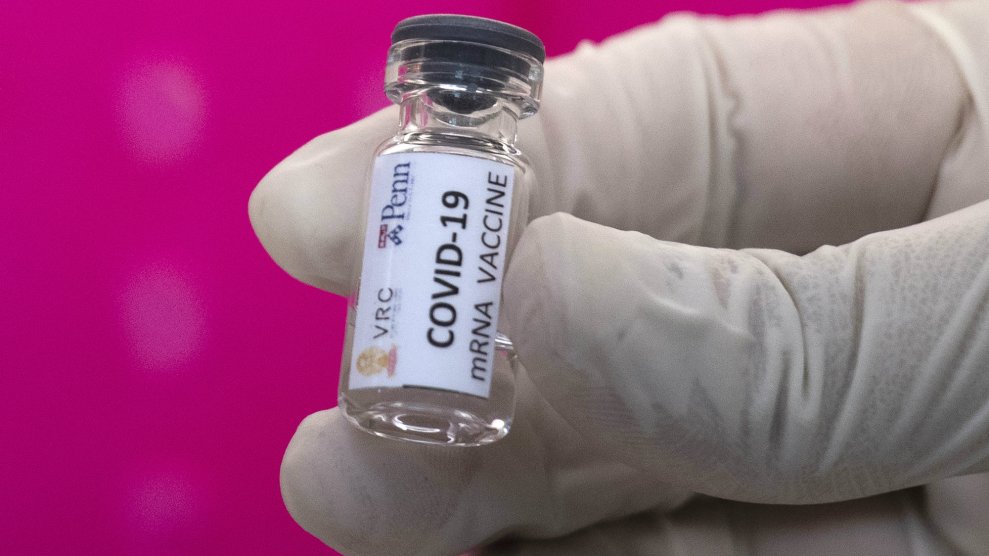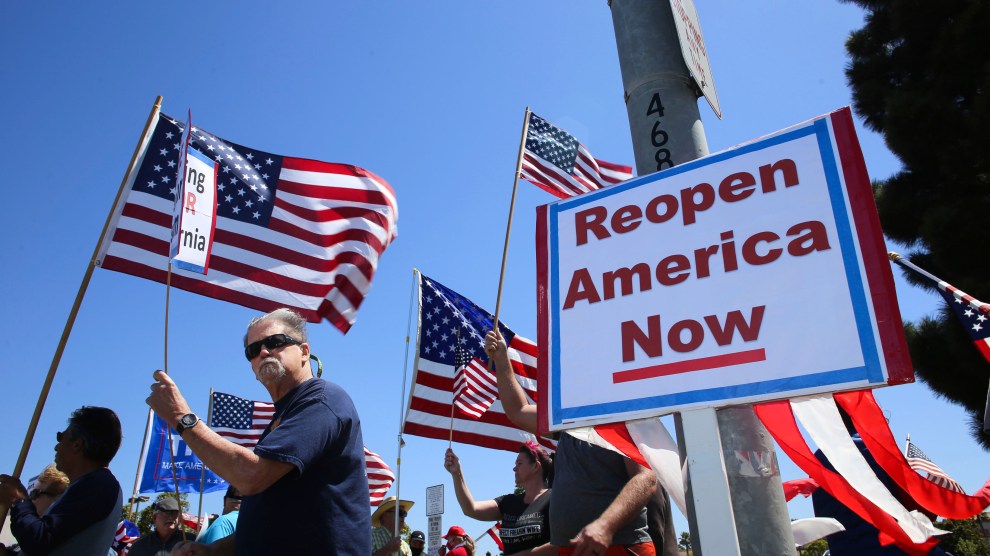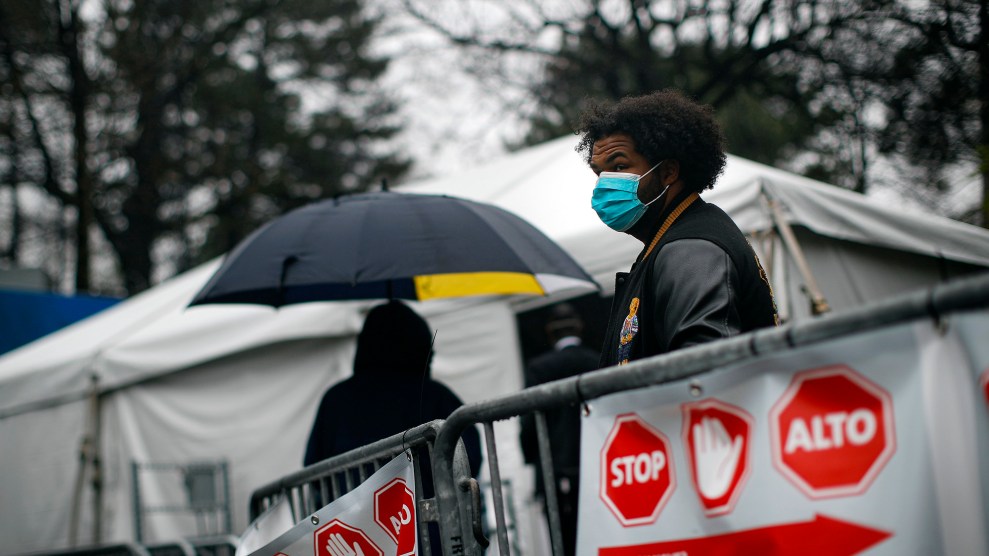
Sakchai Lalit/AP
“You really think I would be promoting something that’s going to be giving vaccines to my people?” Trayon White, a city council member in Washington, DC, wrote in a comment on his Instagram post about the city’s initiative to hire contact tracers, officials who will locate the contacts of people in the city who test positive for COVID-19. The Black Democrat, who represents the city’s Ward 8, which has the highest number of COVID-19 deaths in the city, was responding to a commenter who was urging Black people not to get vaccinated.
White has come under fire for controversial statements—like the time he claimed that Jewish people controlled the weather—but he is beloved in the ward and seen as a fighter for a section of the city plagued by poverty, neglect, and rapid gentrification. Washington City Paper requested comment on the Instagram post, but the council member did not respond to explain what he meant. But for many Black people, he didn’t need to: His words reflected their unease surrounding medical racism and the mistreatment of Black people at the hands of doctors.
This is the side of the anti-vaxx movement rarely seen but in many ways much more mainstream in the Black and Brown communities. “We know that because of the history of segregation, discrimination, and racism there are reasons [Black] people don’t trust the government,” Sandra Quinn a public health professor at University of Maryland, explains. “The government doesn’t always have their best interest at heart.”
The anti-vaxx movement, as it’s become known, is comprised of a loose coalition of people in the United States and around the world who falsely believe that vaccines cause greater physical harm than any disease the vaccine purports to combat. They have already indicated their refusal to receive a vaccine for the novel disease should it become available.
Another #BigFatNothingBurger pharma trying to get people to swallow.. #IDoNotConsent and neither SHOULD YOU! #VaccinesAreNotTheAnswer #PharmaIsTheVirus https://t.co/3dNICTh4Wl
— Dr Sherri Tenpenny (@BusyDrT) May 22, 2020
These generally wealthier, whiter, suburban mothers are often more concerned with some idealistic notion of “choice” and “freedom” than with the findings of public health experts. They congregate on social media sites, sharing misinformation about vaccines causing autism in children, or the body’s capacity to heal itself. Vaccines can and do have side effects, and there have been batches of vaccines that have caused health issues in the past, but public health officials largely agree that overall they are safe and save lives. In recent years, an increasing number of measles outbreaks have begun to pop up around the country, as parents resist vaccinating their children for the contagious disease, which hasn’t been eradicated but was thought to be eliminated because of widespread, mandatory vaccination programs.
“Frankly, these Caucasian, suburban, educated parents believe they can Google the word vaccine and get as much information as anybody,” Paul Offit, the director of the Vaccine Education Center at Children’s Hospital of Philadelphia told the Philadelphia Inquirer.
But COVID-19 has highlighted the presence of another subgroup within the anti-vaccine movement: Black people, whose reasons for suspicion concerning vaccinations are rooted in a complicated mix of mistrusting the federal government, the shadow of having been experimented on before, and data that shows medical racism is endemic. Black people suffering from COVID-19 have frequently been turned away at hospitals, protests to “re-open” the economy surged after more news outlets started reporting on the disproportionate harm the virus was doing to Black people, and they frequently lack access to good health care due to structural inequality.
Some on the fringes have already announced their plans. Right-wing commentators like Candace Owens and YouTube stars turned conservative darlings Diamond & Silk have already announced that when the vaccine for COVID-19 becomes available, they will refuse to get it. Allegedly, the two hosts lost their show on Fox News’ streaming platform after Diamond and Silk specifically said they were rejecting any vaccine backed by Bill Gates—who has poured $300 million into the fight against COVID-19—because they falsely claimed the billionaire philanthropist pushed for population control.
It’s unclear why Owens said she would refuse a COVID-19 vaccine, but she has tweeted in the past about her own Bill Gates’ conspiracy theories and once claimed that she had a bad reaction to the HPV vaccine. She argued that this vaccine, which protects women against some cancers caused by sexually transmitted diseases, shouldn’t be mandatory because HPV is not contagious. To be clear: HPV is contagious.
This is your daily reminder that under no circumstances will I be getting any #coronavirus vaccine that becomes available.
Ever. No matter what.
— Candace Owens (@RealCandaceO) April 27, 2020
The novel coronavirus has caused approximately 100,000 deaths across the United States and infected at least 1.7 million people. The disease caused states to close non-essential businesses leading to widespread job losses and economic calamity. Absent a miracle, scientists and health officials are warning that the virus will continue to spread in some capacity until an effective vaccine can be deployed around the globe. People of color have been disproportionately infected with and killed by this virus. According to data compiled and analyzed by my colleagues, Edwin Rios and Sinduja Rangarajan, in 20 of 28 states and the District of Columbia, Black people comprise a larger share of infections than their proportion of the general population.
As my colleague Jamilah King reported, it’s important that healthcare providers reckon with the legacy of racism that has left Black people skeptical of the medical community:
In response, health practitioners, particularly those who understand institutional and systemic racism to be a pre-existing condition for COVID-19, are now scrambling to fast track messaging to Black patients that doesn’t outright dismiss their concerns. I recently spoke with several doctors from across the spectrum of health care providers waging war against COVID-19 in New York City and in Georgia, where the novel coronavirus is disproportionately killing Black and Brown residents. While each suggests that it’s still too early in the pandemic to develop a complete set of hard and fast rules, or to tout specific successes, they largely agree that it’s absolutely crucial for medical personnel to acknowledge this history of racism when treating Black patients, affirming the reasons for their distrust, and then informing them with the best information available to date.
In a study Quinn did with her colleague Amelia Jamison, another public health expert at University of Maryland, and several others, one of the fault lines in the racial differences about vaccine skepticism can be found in confidence in the government. When they studied trust in different institutions including drug companies, government institutions, and healthcare providers they found stark racial differences. “Nobody trusts the pharmaceutical companies,” Jamison explains. “But white people were generally more trusting of the government.”
In a May AP-NORC poll, 49 percent of people in the United States said they would take a COVID-19 vaccine. Thirty-one percent said they were unsure, while 20 percent said they would not take the vaccine. When broken down by race, the difference is dramatic: Fifty-six percent of whites were willing to take the vaccine but only 37 percent of Latinos and 25 percent of Blacks would do the same.
Despite the immediate public health emergency, the hesitance to take the COVID-19 vaccine may not be surprising. Along with anti-vaxxers who believe in pseudoscience, there are also legitimate concerns about the safety of a vaccine that is produced quickly. “The ongoing illness, death, and calls to socially distance will not alone change the minds of people who distrust vaccines,” Jennifer Reich, a professor of sociology at University of Colorado Denver said in a blog post. “The longer answer is more concerning: a new coronavirus vaccine and the ways government licenses, distributes, and communicates about it risk weakening support for all vaccines.”
One of the most frequent points of reference in explaining the deep and often well-founded suspicion of the medical establishment in the Black community is the 1932 Tuskegee experiment, 40-year clinical study to follow untreated syphilis in Black men. The study began in 1932 in Alabama, with 600 men—399 of them had syphilis while 201 did not. They were told they were being treated for “bad blood,” a colloquial term that encompassed a range of ailments, and were guaranteed to receive free medical treatment. In reality, the experiment’s true purpose was to study the progression of untreated syphilis. In 1972, the Associated Press published a story revealing the lack of treatment, the lack of consent, and the suffering that this community experienced from this study. After a Congressional hearing and a class action lawsuit, the men and their families were awarded millions of dollars in a settlement. But the stain remained, damaging the relationship between the African American community and health care providers. That distrust would play out during other public health crises for years to come.
While the researching the public health response to HIV/AIDS during the late 1980s, Quinn says the Black community was worried that HIV was a manmade virus created for the purposes of genocide. Some people believed it was created by the Central Intelligence Agency to kill Black people. Even though those conspiracy theories about HIV/AIDS have less currency today, when the disease first emerged, rumors about the origin were widespread.
In 2001, postal workers at the Brentwood Post Office and US Senate staffers in Washington, DC were exposed to anthrax after a terrorist mailed the harmful substance to US Senators. The vast majority of the postal workers were Black, while the Senate staffers were predominantly white. Following their diagnoses, both groups of employees deemed at higher risk were given antibiotics for 60 days. At the end of the 60 days, doctors recommended extending the antibiotic usage for another 40 days or receive a vaccine. Thirty-eight percent of the Senate workers and only 2 percent of the Brentwood workers chose the vaccine. Four years later, the American Journal of Public Health conducted a focus group of those same employees. Many of the Brentwood group were worried they were being used as guinea pigs and didn’t necessarily trust the vaccine because it was “experimental.”
The 2020 pandemic is unmatched in severity or scope, but the emerging conspiracy theories that have taken hold in the Black community feel familiar. Several have been making the rounds on social media, including that the virus is caused by 5G cell towers, and the vaccine (which has yet to be developed) will inject a tracking device inside of you. “The fears are always there, but they’re often raised from within the community,” Quinn says. “Now, they’re seized upon in social media and used to sow distrust and doubts about the vaccine.” It doesn’t help that the president has not disavowed the message from vaccine skeptics. After Diamond & Silk lost their show for promoting conspiracy theories around the virus and potential vaccines, the president tweeted praise for them.
Earlier this month, Trump announced Operation Warp Speed, a project to develop a vaccine at record speed in order to accelerate reopening businesses, schools, and returning to a normal life. According to polling data, the majority of the American public disapproves of the job the federal government is doing, making it a challenge to convince skeptics that a vaccine produced at record speed would be totally safe. In countries thought to have done a better job handling the pandemic, like South Korea and New Zealand, trust in the top level government officials is considered to have played a key role in containing the severity of the spread. In order to implement an effective national testing, contact tracing, and isolation strategy, Americans would have to put their trust in a government that has not inspired much of it. “The problem is that all the major scenarios for reopening the US economy are premised on trust,” Foreign Policy reported in April. “Will Americans really trust an entity—whether government, business, or nonprofit organizations—that compiles and tracks such personal data?”
Problems of trust in government aren’t unique to Trump. In 2009, the swine flu vaccine was considered an emergency vaccine because it had been quickly produced. Quinn studied the willingness to take an “emergency” vaccine among all the racial groups. Black people were more likely than any others to be skeptical of it.
Whatever the troubling history, it’s critical that the Black community take the vaccine when it is finally available. Not only are they more susceptible to the virus because of long-standing structural racism that has left them with a disproportionate share of underlying health conditions, they are also more likely to be employed in jobs that require constant contact with other people like transit workers, delivery drivers, and mail carriers. “Who’s most at risk?” Quinn explains. “We definitely need African Americans to get it. It’ll be devastating if they don’t.”










